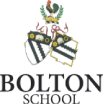
Simon Armitage, poet, playwright, novelist, Professor of Poetry at Oxford University and one of the country’s most feted contemporary writers inspired young and old alike at Bolton School Girls' Division with his wry humour, insightful reflections and masterful wordplay. He told the public gathering of local pupils, teachers, families and friends of the School, that if you want to be a writer, the only true advice he can give “is to read”. This will influence what you do and do not write. He called to mind a quote from Blake Morrison, which said try not to write about the meaning of life as you will hit a brick wall but if you write about the brick wall you might just stumble across the meaning of life! His advice was, if you can, to write about the universal through the particular. Simon said that he is still amazed that with just 26 letters, arranged in the right order, you can connect with people silently over thousands of miles – ‘poetry is the most potent form of primitive magic’.
Simon chose a wide selection of readings, spanning, non-sequentially, his entire career and gave background to each piece, frequently laced with subtle humour. ‘Zodiac T-shirt’ recalled an old punk friend, now festooned in tattoos, and a very hot summer in Huddersfield in 2013; a poem from the last century ‘Kid’, which is written as a dramatic monologue from Robin the Boy Wonder , deals with a person finding their way in the world; two poems from a larger collection called ‘Book of Matches’, the first followed on from the theme of the last poem of leaving home and reflected on his relationship with his mother, the other focused on his dad and was kind of an answer to him after he had asked Simon “what does this mean?” when Simon had his ear pierced ten years earlier; and ‘Killing Time No. 2’, which he prefaced by asking the pupils if they felt hurried in their everyday life and he spoke of his own journey of moving from an analogue, clockwork era to a fast moving digital age and his anxiety at not being able to keep up. Giving everyone a “final three poem warning” he recited ‘New Cemetery’ and warned how extremists now believe the only true from of environmentalism is not to have children, a poem about the joy of briefly reclaiming the streets after the Tour De France embarked from Yorkshire and, after he spoke about how airports’ otherness intrigues him, a poem entitled ‘Aviators’.
The floor was then opened to questions, which Simon answered candidly. Asked about writing his first poem, he recalled penning a poem aged 10 at Junior School and whilst the teacher said it was good, it was not one of the top six that were put on the wall! He wondered if his whole life had subsequently been about trying to show that teacher that his work is worthy! Asked if he ever gets writer’s block, he said his problem was not having ideas but the challenge is to find a way of saying things, a style, that makes the commonplace seem fresh or engaging. He said that when you realise you are going to become a published poet, your writing does change a little as you are no longer writing for yourself and that you must ‘meet people in the middle’. He said he does carry a notebook for jotting down ideas as well as keeping a journal and that he has always been a list-maker. Considering the question of rhyming, he said it did go out of favour for a while but now most poets are quite relaxed about it, the important thing is to not let it dictate the poem. Talking about his favourite poem, he said it was one he wrote when he was a Probation Officer working in Rochdale. By the time he had driven the 45 minute commute to work, it was complete in his head and he wrote it down in its entirety as soon he got to the office! Asked who his favourite poet was, he said it was Ted Hughes who had awakened him to the art form and that he had been asleep before that. He ended the evening with a recital of ‘I Kicked a Mushroom’ which carried surprising emotional intensity given the subject matter. He had held the audience in his palm from his very first words.
Earlier in the evening, girls from across all year groups in the Senior School had served as the warm-up acts as they performed their own work, including Amelia Doherty’s Compasses poem which achieved third place in the Goodreads’ Poetry Competition, where, earlier this year, she had been the youngest ever finalist. The pupils’ work dealt with a wide range of issues including finding your potential, the Japanese art of Kintsukuroi, falling in love with an inanimate object, dawn in a Chinese town, the morning walk to School, polar nights, Wordsworth and female authors. English teacher Mrs Kingsford spoke of how creativity and imagination is highly esteemed in the Girls’ Division and how beyond the curriculum, pupils enjoy Journal classes in Years 7, 8 and 9, poetry competitions, the after-school Joint Creative Group and the residential Writing Retreat at Patterdale Hall. She told how writing allows us to find our own voice and to address the issues common to humanity. She said the poem is the most personal of all art forms and words can build a bridge from the writer’s heart to the reader’s.
Watch a selection of pupils' poetry readings from the night via the following links:























